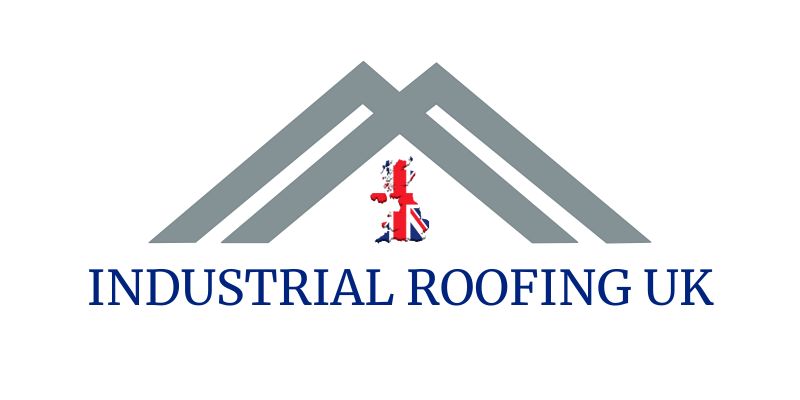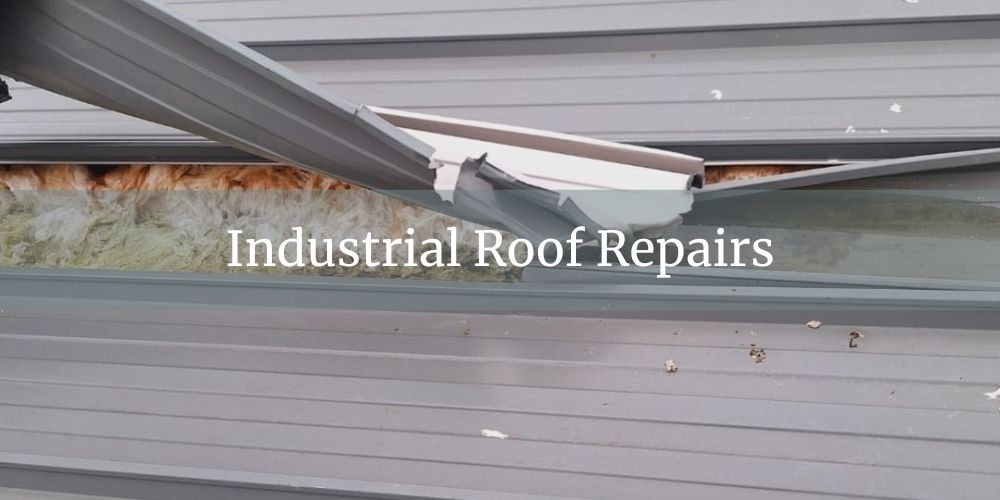Industrial roof repairs refer to the process of fixing and restoring roofing systems in industrial buildings. This involves addressing damage caused by wear and tear, weather, or structural issues, ensuring the roof remains functional and safe. Effective repairs are essential to prevent leaks, enhance the building's longevity, and avoid costly disruptions to operations. Timely intervention helps maintain the roof’s integrity and overall performance, ensuring the facility runs smoothly.
Industrial Roofing UK provide reliable industrial roof repair services across the UK, helping businesses address issues quickly and restore the integrity of their roofing systems. We repair damage caused by leaks, corrosion, storm impact, failed fixings, and membrane deterioration across all major roof types, including metal, single-ply, and built-up systems. Our skilled team uses durable materials and proven techniques to deliver long-lasting repairs with minimal disruption to ongoing operations. Serving factories, warehouses, and industrial facilities nationwide, we focus on restoring performance, preventing further damage, and extending the life of your roof.
What Are Industrial Roof Repairs?
Industrial roof repairs involve addressing and fixing various issues in the roofing systems of industrial buildings such as factories, warehouses, and manufacturing facilities. These repairs can include sealing leaks, fixing punctures, treating rust, and reinforcing damaged sections to ensure the roof remains watertight and structurally sound. According to the National Federation of Roofing Contractors (NFRC), timely repairs are crucial to prevent minor issues from escalating into major problems which could compromise the roof's integrity.
The repair process typically starts with a comprehensive inspection to determine the extent of the damage, followed by cleaning and preparing the affected areas. Different materials, such as sealants, patches, and membranes, are used depending on the specific roofing material and the severity of the damage. The Building Research Establishment (BRE) emphasises the importance of using top-quality materials and skilled professionals for effective and durable repairs. BRE studies indicate regular maintenance and prompt repairs can extend the lifespan of industrial roofs by up to 40%, significantly reducing overall costs.
Investing in industrial roof repairs not only protects the building's structural integrity but also ensures the safety and efficiency of operations within the facility. By addressing issues promptly, facility managers can avoid costly disruptions and potential safety hazards, maintaining a productive and secure environment. This proactive approach supports the long-term sustainability and operational efficiency of industrial sites.
Have a question about an upcoming project?
What Are The Signs Industrial Roof Repairs Are Required?
Signs industrial roof repairs are required include; visible damage, water leaks, and increased energy costs. These indicators suggest underlying issues compromising the roof's integrity and efficiency. Addressing these signs promptly can prevent further damage and costly repairs.
- Visible Damage
- Water Leaks
- Sagging or Uneven Roof Surface
- Rust and Corrosion
- Pooled Water
- Increased Energy Costs
- Clogged or Damaged Gutters
- Damaged Flashing
1. Visible Damage
Visible damage is a clear sign industrial roof repairs are needed. This can include cracks, holes, or missing sections of roofing material, compromising the roof’s integrity. Such damage often occurs due to severe weather, physical impact, or wear and tear over time. According to the National Federation of Roofing Contractors (NFRC), addressing visible damage promptly can prevent further deterioration and more costly repairs.
2. Water Leaks
Water leaks indicate immediate industrial roof repairs are necessary. Leaks can lead to major interior damage, mould growth, and structural issues if not addressed. These leaks often originate from damaged seams, flashing, or roofing materials. The Building Research Establishment (BRE) states addressing leaks quickly helps maintain the roof's waterproofing capabilities and protects the building's interior.
3. Sagging or Uneven Roof Surface
A sagging or uneven roof surface is a critical indication industrial roof repairs are required. This issue often results from structural damage, water accumulation, or the failure of roofing materials. An uneven roof surface can lead to further water pooling and increased stress on the roofing structure. Repairing the underlying issues can restore the roof's structural integrity and prevent further damage, as industry experts suggest.
4. Rust and Corrosion
Rust and corrosion on metal roofs signify the need for industrial roof repairs. These issues weaken the metal, making it more susceptible to leaks and structural failure. Corrosion often starts at seams and fasteners where protective coatings have worn away. Data from the British Coatings Federation (BCF) indicates addressing rust and corrosion early can extend the lifespan of the roof and prevent more extensive repairs.
5. Pooled Water
Pooled water on the roof surface indicates drainage problems requiring industrial roof repairs. Standing water can lead to leaks, material degradation, and increased weight on the roof structure. This issue is often caused by clogged drains, improper roof slope, or damaged roofing membranes. Ensuring proper drainage can prevent water-related damage and maintain the roof's integrity.
6. Increased Energy Costs
Increased energy costs can be a sign industrial roof repairs are needed. Poor insulation or damaged roofing materials can allow heat to escape in winter and enter in summer, driving up energy bills. Addressing these issues through repairs or upgrades can improve the roof's energy efficiency. The Energy Saving Trust reports that improved insulation can reduce energy costs by up to 25%.
7. Clogged or Damaged Gutters
Clogged or damaged gutters indicate industrial roof repairs might be necessary. Gutters not functioning properly can cause water to overflow and damage the roof and building exterior. Routine maintenance and repair of gutters ensure proper water drainage. This helps prevent water accumulation on the roof and related damage.
8. Damaged Flashing
Damaged flashing around vents, chimneys, and skylights is a sign industrial roof repairs are needed. Flashing protects these vulnerable areas from water intrusion. When flashing is damaged, it can lead to leaks and structural damage. Repairing or replacing damaged flashing is essential to maintain the roof's waterproofing capabilities.
Industrial Roof Repair Checklist
| Sign | Description |
|---|---|
| Visible Damage | Cracks, holes, or missing sections of roofing material, compromising the roof’s integrity. |
| Water Leaks | Major interior damage, mould growth, and structural issues due to damaged seams, flashing, or roofing materials. |
| Sagging or Uneven Roof Surface | Structural damage, water accumulation, or failure of roofing materials leading to an uneven surface and increased stress on the structure. |
| Rust and Corrosion | Weakened metal making the roof susceptible to leaks and structural failure, often starting at seams and fasteners where protective coatings have worn away. |
| Pooled Water | Standing water indicating drainage problems, leading to leaks, material degradation, and increased weight on the roof structure. |
| Increased Energy Costs | Poor insulation or damaged roofing materials allowing heat to escape in winter and enter in summer, driving up energy bills. |
| Clogged or Damaged Gutters | Gutters not functioning properly causing water to overflow and damage the roof and building exterior. |
| Damaged Flashing | Compromised flashing around vents, chimneys, and skylights leading to leaks and structural damage. |
What Are The Most Common Types of Industrial Roof Repair?
The most common types of industrial roof repair include; patching leaks, replacing damaged sections, reinforcing seams, applying industrial roof coatings, and repairing flashing. These repairs are essential for maintaining the integrity and performance of industrial roofs.
- Patching Leaks
- Applying Industrial Roof Coatings
- Replacing Damaged Sections
- Reinforcing Seams
- Repairing Flashing
1. Patching Leaks
Patching leaks is a fundamental industrial roof repair method. Leaks can occur due to various factors, such as weather damage, ageing materials, or improper installation. Patching involves identifying the source of the leak and applying suitable materials to seal it, preventing further water ingress and interior damage. Timely leak repairs are essential to avoid extensive water damage and structural issues, providing a cost-effective solution.
2. Applying Industrial Roof Coatings
Applying industrial roof coatings is a common repair method to enhance the roof’s durability and weather resistance. Coatings such as silicone, acrylic, or polyurethane provide a protective barrier against environmental factors, UV radiation, and moisture. This method helps extend the roof's lifespan and improve its performance. According to the British Coatings Federation (BCF), proper application of protective coatings can extend a roof's life by up to 20 years, making it a cost-effective solution.
3. Replacing Damaged Sections
Replacing damaged sections of the roof is necessary when parts of the roofing material are beyond repair. This repair method ensures the overall integrity of the roof by removing and replacing the compromised areas. It is often required for metal roofs, where corrosion or physical damage has significantly weakened the structure. Replacing damaged sections can restore the roof’s strength and durability.
4. Reinforcing Seams
Reinforcing seams is essential to prevent leaks and ensure the roof remains watertight. Over time, seams can deteriorate due to thermal expansion, weather exposure, or ageing materials. Reinforcing involves applying additional materials or sealants to strengthen the seams and prevent water penetration. This repair method is particularly important for flat roofs and large industrial roofs with numerous seams.
5. Repairing Flashing
Repairing flashing around vents, chimneys, and skylights is crucial to maintain the roof's waterproofing capabilities. Flashing can become damaged or deteriorate over time, leading to leaks and structural issues. Repairing or replacing compromised flashing ensures these vulnerable areas remain protected from water intrusion. Adequate flashing repair is essential for preventing leaks and maintaining the roof's integrity.
Are The Repairs Needed on Industrial and Commercial Buildings Different?
Yes, the repairs needed on industrial and commercial buildings often differ due to the distinct functions and structural demands of each type. Industrial buildings typically require more sturdy repairs because they face severe environmental conditions, house heavy machinery, and have larger roof areas. Repairs in industrial settings often focus on addressing issues like structural reinforcement, significant leak repairs, and the application of high-quality coatings to the existing roof.
In contrast, commercial buildings generally face different challenges, such as maintaining aesthetics and accommodating lighter foot traffic. Commercial roof repairs may involve fixing small leaks, repairing cosmetic damage, and ensuring the roof integrates well with the building's overall design. Additionally, commercial buildings often prioritise energy efficiency and appearance, leading to different repair techniques and materials compared to industrial settings.
While both types of buildings require regular maintenance and timely repairs, the scale, materials, and methods used can vary significantly. For example, industrial roofs might need reinforced seams and high-quality coatings to handle challenging conditions, whereas commercial roofs might focus more on visual appeal and insulation. Addressing the specific needs of the existing roof in each type of building ensures effective and long-lasting repairs. According to the National Federation of Roofing Contractors (NFRC), choosing appropriate materials and techniques based on the building type can extend the roof's lifespan by up to 30%.
How Much Do Industrial Roof Repairs Cost?
The cost of industrial roof repairs typically ranges from £450 to £740. However, prices can vary depending on the specific type of repair required. For example, industrial roof leak repairs range from £450 to £650, while industrial roof coatings are priced between £46 to £88 per square metre (sqm). The table below provides an overview of the estimated cost range for different industrial roof repair services. These estimates can help you plan your budget based on the specific needs and requirements of your industrial roofing project.
| Service | Cost Range |
|---|---|
| Industrial Roof Repairs | £450 to £740 |
| Industrial Roof Leak Repair | £450 to £650 |
| Industrial Roof Coatings | £46 to £88 per sqm |
*These estimates are general and actual costs can vary based on specific project requirements, location, and market conditions.


